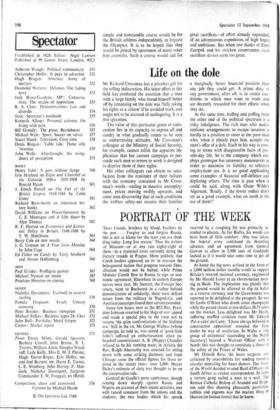Life on the dole
Mr Richard Crossman has a priceless gift for the telling indiscretion. His latest effort in this field has produced the assertion that a man with a large family who found himself better off by remaining on the dole was 'fully taking his rights as a citizen' if' he avoided work, and ought not to be accused of malingering. It is a fine specimen.
The value of this particular genre of indis- cretion lies in its capacity, to expose all and sundry in what gradually comes to be seen as embarrassing attitudes. Mr Crossman's colleague at the Ministry of Social Security, for example, cannot relish the apparent im- plication that her current campaign to per- suade such men to return to work is designed to deprive them of their rights.
His other colleagues can obtain no satis- faction from the reminder of their failures with the economy contained in Mr Cross- man's words—ending in massive unemploy- ment, prices moving swiftly upwards, and some men discovering that in such conditions the welfare safety-net secures their families a marginally better financial position than any job they could' get. A. prime duty of any government, after all, is to create con- ditions in which men want to work and are. decently rewarded fOr their efforts when they do.
At the same time, huffing and puffing from the other end of the political spectrum is a risky indulgence. The rich man who makes intricate arrangements to escape taxation is hardly in a position to sneer at the poor man who, when it plainly pays him, accepts the state's offer of a dole. Each in his way is com- ing to terms with disagreeable facts of pre- sent-day life. So is the company which em- ploys grotesque but necessary manoeuvres in order to minimise its liability to selective employment tax. It is no good applauding some examples of financial self-defence and deploring others. The time is past when it could be said, along with Oscar Wilde's Algernon, 'Really, if the lower orders don't set us a good example, what on earth is the use of them?'


































 Previous page
Previous page